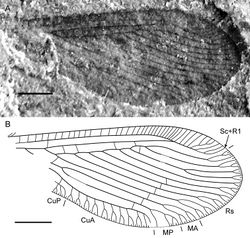Sinosmylites\according to Makarkin et al 2011
| Notice: | This page is derived from the original publication listed below, whose author(s) should always be credited. Further contributors may edit and improve the content of this page and, consequently, need to be credited as well (see page history). Any assessment of factual correctness requires a careful review of the original article as well as of subsequent contributions.
If you are uncertain whether your planned contribution is correct or not, we suggest that you use the associated discussion page instead of editing the page directly. This page should be cited as follows (rationale):
Citation formats to copy and paste
BibTeX: @article{Makarkin2011ZooKeys130, RIS/ Endnote: TY - JOUR Wikipedia/ Citizendium: <ref name="Makarkin2011ZooKeys130">{{Citation See also the citation download page at the journal. |
Ordo: Neuroptera
Familia: Berothidae
Name
Sinosmylites Makarkin & Yang & Ren, 2011 sp. – Wikispecies link – Pensoft Profile
Description
Hind wing approximately 6.5 mm long, 2.7 mm wide. Humeral lobe not extended; frenulum poorly-developed consisting of few bristles. Costal space narrow, dilated towards apex. Subcostal veinlets simple, more closely-spaced apically. Sc distally fused with R1 far from wing apex; Sc+R1 with seven long veinlets (one forked). Subcostal space relatively broad, with one basal crossveins. R1 space nearly as wide as subcostal space; four crossveins before fusion of Sc, R1. Rs with seven pectinate, regularly spaced branches; one branch deeply forked. Rs1 originating at some distance from origin of Rs. Proximal crossvein m-r long, connecting Rs1 near its origin with M. M forked distal to origin of Rs1. MA, MP almost parallel, distally with few branches. CuA long, slightly incurved, in general parallel to hind margin, with nine forkes branches originated at angle >45 degrees, one simple branch. CuP short, with two branched preserved. 1A–3A not preserved. Crossvein between CuA, 1A (or CuP). One crossvein between Rs, Rs6 in ‘inner’ gradate series (possibly anomalous). Six crossveins (from Rs4 to CuA) in ‘outer’ gradate series preserved. Wing one color, fuscous. Veins appear mainly dark brown.
Material examined
Specimen CNU-NEU-NN2011004, deposited in CNUB. A nearly complete hind wing.
Type locality and horizon
Daohugou Village, Shantou township, Ningcheng county, Inner Mongolia, China. Jiulongshan Formation, Middle Jurassic.
Comments
The venation of this hind wing is typical for Berothidae. In particular, the configuration of CuA is characteristic of this family; although this also occurs in the Nevrorthidae, nevrorthid venation is otherwise dissimilar. Also, the basal crossvein between R and M systems is straight, perpendicular to connecting veins; this is characteristic of all Berothidae except Rhachiberothinae. In the vast majority of extant Berothidae, the complete CuP is lost, but the basal or/and distal parts there are often present. CuP is entirely lost in some genera, both fossil (e.g., Microberotha macculloughi Archibald and Makarkin, 2004) and extant (e.g., Cyrenoberotha MacLeod and Adams, 1968, Berlekrumyia Aspöck and Aspöck, 1988). Therefore, it is hard to determine which vein is preserved in this hind wing, the distal part of CuP or 1A (see Fig. 5B, labeled CuP), as the proximal portion of the wing is not preserved. We tentatively consider this vein to be CuP.
This specimen is tentatively assigned to Sinosmylites. The hind wings of Sinosmylites rasnitsyni sp. n., the only species of the genus in which these are known,are quite poorly preserved and their venation does not enable its generic character states to be determined with confidence. However, this hind wing shares similar size, coloration, and venation (e.g., Sc and R1 are fused; Sc+R1 with many branches; several crossveins between R1 and Rs; the same configuration of the Rs branches) with the forewings of Sinosmylites species. Therefore, this generic affinity is most likely.
Taxon Treatment
- Makarkin, V; Yang, Q; Ren, D; 2011: Two new species of Sinosmylites Hong (Neuroptera, Berothidae) from the Middle Jurassic of China, with notes on Mesoberothidae ZooKeys, 130: 199-215. doi
Images
|
